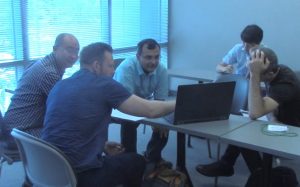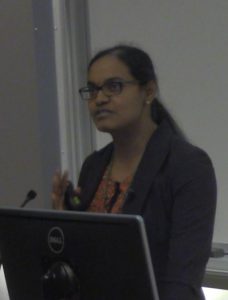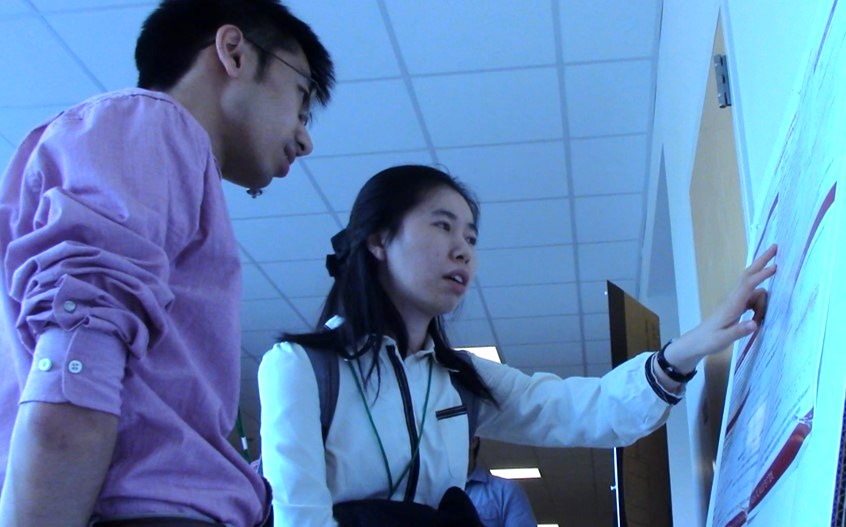
Almost 150 mathematicians, statisticians, data and biomedical scientists participated in the opening workshop for the Program on Statistical, Mathematical, and Computational Methods for Precision Medicine (PMED) on the campus of N.C. State University (NCSU) in mid-August.
The goal of the PMED program is to bring together mathematical, statistical, computational, and biomedical scientists in order to develop innovative advances in data-driven, quantitative methodology for precision medicine.
“Personalized medicine is a recently developed hot area in bio medicine and medicine that is about custom-tailoring treatments, medicines and interventions for the individual person,” said Elvan Ceyhan, Deputy Director of SAMSI and a directorate liaison for the PMED Program. “There are a lot of methodological, statistical and mathematical and practical challenges, so there is a dire need to address these issues.”
Researchers from all over the United States attended the week-long event that opened SAMSI’s 2018-19 academic programs. There were numerous talks from some of the most influential minds in biomedicine, applied mathematics and statistics. The researchers highlighted a wide-range of methodologies and approaches used in precision medicine
“I have been interested in this general area for quite some time…I am a biostatistician, so I work with problems in the health sciences,” said Marie Davidian, professor of statistics in the Department of Statistics at NCSU and a local scientific contributor to the PMED program. “This is the big challenge in how science research can personalize treatment to the patient. My research area involves statistical methodologies directed toward that goal.”
PMED produced eight working groups and one subgroup for this academic program year. The working groups will focus primarily on medical issues that require more refined and accurate data derived by biostatisticians, applied mathematicians and other researchers.

“In general, in regular medicine, statistics is applied for the average person, but an average person is not really a person as much as it is median data point, there is no ‘average person,’ said Ceyhan. “In personalized medicine, each person is an individual and different. In this field, the treatment would be customized to the individual, which causes a lot of uncertainty from person to person and unexpected outcomes. Statistics is very useful in predicting bounds or quantifying those uncertainties.”
This SAMSI workshop is helping to bring together a diverse group of professionals who do not ordinarily collaborate. Programs like this one in precision medicine are forging a path towards using more dynamic and broad-based methods to ensure that more effective and efficient medicines and treatments can be used to improve an individual’s healthcare needs.
“What strikes me, just from the talks I’ve seen, is the diversity of the approaches that different disciplines are taking to address these problems,” said Davidian.
Davidian is hopeful that the internal collaborations on the working groups lead to some innovative approaches as to how statisticians can make an impact into improving precision medicine.
The issues being discussed are not only beneficial to the more senior researchers, but also to the next generation of statisticians – Master of Science and Ph.D. students.
“The thought of personalized medicine and tailoring treatments to individual characteristics is exciting to me,” said Yeng Saanchi, a statistics student enrolled in the graduate program at NCSU. “I don’t think giving generic treatments to everybody, irrespective of their individuality is the way to go, especially if we want healthcare to be efficient and effective.”
Saanchi appreciated the opportunity to have access to a large number of experts in her field and in medicine. In many ways it has helped her to realize where her talents in statistics can be valuable.
“Aside from the great exposure to the work that is being done in the field in precision medicine and meeting all of these knowledgeable people and talking to them about their work, I hope to be able to see how my research could possibly tie into the personalized medicine field,” she said.
“SAMSI workshops are great in order to get a conversation started about a particular subject and building networks to address various problem definitions in those subjects,” said Ceyhan. “SAMSI is very experienced in this…We have received positive feedback already from participants that they have met new people from new areas of study and they look forward to further collaborations.”
In addition to the opening workshop and working group research, the PMED program will also host a spring course for graduate students in 2019. It will be interesting to see what new and innovative ideas come out of this experience.
To see more information about the PMED program, visit: /pmed.
